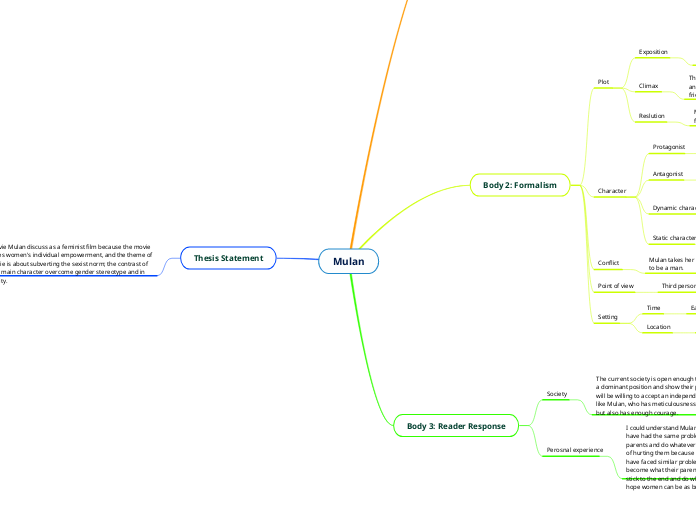Mulan
Body1: Feminism
Gender norm
Subverting the sexist norm
Mulan does not wear dresses and make up to make herself beautiful like the typical Disney princesses, nor does she wait for someone to pay the price to love and save her like Cinderella. Mulan broke the traditional girl's perception that only a beautifully dressed girl could be loved and saved, and she became a powerful and self-sufficient woman.
Women's power
Promotes women's individual empowerment
"I will never pass for a perfect bride or a perfect daughter "
"That if I were to truly to be myself I would break my family's heart"
At the beginning of the story, Mulan's parents have always expected Mulan to get married and bring glory to the family. And this is exactly what Mulan didn't want, she didn't want to be that kind of person, but she is afraid that she will hurt her family if she be herself. While when Mulan decided to replace her father as a soldier, she finally had a reasonable reason to move towards a completely different life.
Gender stereotype
Comparison between the reality and the story
Mulan used her outstanding ability to prove that even as a woman, she still has strong power. However, for society at that time, the examples of Mulan were very few. Society believes a woman should not strive to be knowledgeable; she only needs to know how to cook, look pretty, and stroke her husband’s ego.
As for the current society, women's education level has generally improved, and they have more opportunities to show their abilities. The emergence of increasingly successful women represents the rise of female power, women have the same strength as others.
Body 2: Formalism
Plot
Exposition
Mulan is a young woman living in a traditional Chinese family, and she attends a matchmaking ceremony with her mother and grandmother, but she fails because she can't act as the matchmaker wanted.
Climax
The Emperor is kidnapped in the capital city by the Bori Khan, and Mulan brings herself respect by utilizing her intellect and friends to overcome the Bori Khan and save the Emperor.
Reslution
Mulan returns her family as a hero, and her family is grateful for what she did and happy to have her back safely.
Character
Protagonist
Mulan
The eldest daughter of the family. she disguised herself as a man named Huajun, serving in the army for her father.
Antagonist
Bori Khan
In order to avenge his father, he led the army to invade Mulan's hometown, and he plan to sneak into the palace to murder the emperor.
Dynamic character
Xianniang
A powerful but pathetic witch who became Bori Khan's subordinate after being expelled by her tribe. After meeting Mulan, she was touched by Mulan's firm belief and strong self-confidence and died to save Mulan in the end.
Static character
The Emperor
The king of Imperial China.
Conflict
Mulan takes her father's place to join the Army and pretends to be a man.
Point of view
Third person point of view
Setting
Time
Early 15th century
Location
Imperial China
Body 3: Reader Response
Society
The current society is open enough to allow women to stand in a dominant position and show their personal abilities. People will be willing to accept an independent and powerful woman like Mulan, who has meticulousness that is unique to women but also has enough courage.
Perosnal experience
I could understand Mulan's cwhen she wants to be herself. I have had the same problem before, I didn't want to follow my parents and do whatever they told me to do so, but I was afraid of hurting them because I know they love me. Most women have faced similar problems, some chose to shrink back and become what their parents asked for; while the others chose to stick to the end and do what they wanted to do. In this case, I hope women can be as brave as Mulan.
Thesis Statement
The movie Mulan discuss as a feminist film because the movie promotes women's individual empowerment, and the theme of the movie is about subverting the sexist norm; the contrast of how the main character overcome gender stereotype and in the reality.
